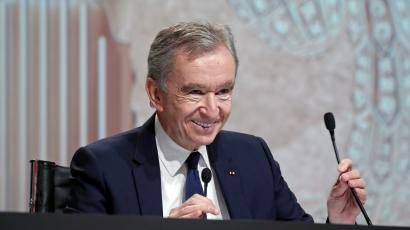Someone Just Overtook Bill Gates As The Second-Richest Man In The World – And He Is No Techie!

Bill Gates has either been the richest or second-richest man in the world since 2008. Until yesterday.
Microsoft’s head honcho, Bill Gates, has been unseated from second spot in the elite class that is the list of the world’s richest people. It will only be the second time this is happening in the last seven years and this time, it is French Billionaire, Bernard Arnault, Chairman of LVMH (Moet Hennessy – Louis Vuitton) who has taken his spot.
As can be deduced from both Bloomberg Billionaires Index and calculations by Forbes, the Frenchman climbed into the second spot — now just behind Amazon’s Jeff Bezos — after his net worth increased to USD 108.2 Bn as of noon yesterday, bettering Gates’ current fortune believed to be worth USD 107 Bn.

Source: qz.com
As of March this year, Arnault, who is France’s richest man, had a net worth of USD 76 Bn. He was the fourth richest person on the planet at the time and it wasn’t until last month that his fortune reached the USD 100 Bn mark; a climb that was helped in no small part by the record-setting shares of his conglomerate LVMH. The company shares have been up by over 50 percent since the turn of the year.
As of yesterday, Arnault’s wealth surpassed Gates’ by USD 300 million. It’s the first time since 2008 that Gates has not been either the first or second richest person in the world. Microsoft shares, too, have been hitting record highs, but they have been outdone by LVMH. Plus Gates now holds the majority of his fortune outside of Microsoft and likes to give a lot of his money away too.
Bernard Arnault has added USD 39 Bn to his net worth since June 2018, the biggest leap by an individual among the 500 people on Bloomberg’s ranking.
Arnault’s rise is hinged on the fact that high-end buyers continue to pick up luxury goods around the world. LVMH reported record sales and profits of roughly USD 52.5 Bn and USD 11.2 Bn for the 2018 fiscal year. Sales were up 16 percent in the first quarter, to USD 14 Bn. Profits, which are reported semiannually, will be announced later this month.
And things can only get better as Arnault is not one to rest on his oars. It’s been 35 years since he first ventured into the luxury goods business with the purchase of Christian Dior and he is just as committed as ever to innovating and refreshing the LVMH brand.
Early this week, he announced a venture with fashion designer Stella McCartney. The move comes less than two years after McCartney severed ties with LVMH’s rival Kering (run by Francois-Henri Pinault, son of French billionaire, Francois Pinault), and took full ownership of her company.

Source: Forbes
The LVMH-McCartney partnership deal came in the wake of the luxury group’s two highly-touted partnerships with superstar singer, Rihanna — Fenty Beauty and Fenty fashion house — as well as recent deals such as the acquisition of Belmond, which operates luxury hotels, trains, and even safaris.
Arnault currently holds the controlling share in LVMH through a family company and a 97 percent stake in Christian Dior. Besides the brands that form its acronym, LVMH controls brands like Givenchy, Don Pérignon (a champagne brand), and Sephora (beauty retailer).
According to Bloomberg, Bill Gates would still be the world’s richest man if not for his philanthropy. He is reported to have donated USD 35 Bn through the Bill and Melinda Gates Foundation to various causes.
During a visit to Nigeria, the billionaire said the foundation has donated USD 1.6 Bn to humanitarian causes in Africa’s largest economy.
Jeff Bezos is still the world’s richest man with a net worth of USD 125 Bn, despite recently reaching a ‘generous’ divorce settlement with his ex-wife, MacKenzie Bezos. The USD 38 Bn payoff put her in fourth place on the list of the world’s richest women.
Featured Image Courtesy: YouTube